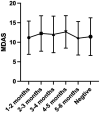Influence of experiencing SARS-CoV-2 infection on anxiety levels in Chinese patients undergoing third molar surgery
- PMID: 38577119
- PMCID: PMC10991755
- DOI: 10.3389/fpsyg.2024.1307776
Influence of experiencing SARS-CoV-2 infection on anxiety levels in Chinese patients undergoing third molar surgery
Abstract
Background: In China, most of the citizens experienced SARS-CoV-2 infection since the end of 2022. The Coronavirus disease 2019 (COVID-19) pandemic affected people's physical health and also had a significant impact on mental well-being. The present study aims to discover if the experience of SARS-CoV-2 infection influences patients' anxiety toward third molar surgery in the Chinese population.
Materials and methods: The present study took the form of a questionnaire survey. From January 1, 2023, to June 30, 2023, patients who went to the Stomatology Center of China-Japan Friendship Hospital (Beijing, China) for the third molar extraction were included according to the inclusion criteria. The information on COVID-19 infection and the Modified Dental Anxiety Scale (MDAS) was collected. The software SPSS 22.0 was used for the statistical analyses.
Results: A total of 574 survey results were harvested in the present study. The infection rate of COVID-19 was 86.6% (p > 0.05). The Average MDAS scores between patients who had been infected with COVID-19 and patients who were never infected were not significantly different (11.65 ± 4.41 vs. 11.42 ± 4.41, p > 0.05). The subgroup analysis was conducted according to the length of time after the recovery of COVID-19 (Model 1), and the highest temperature during the infection (Model 2). In Model 1 and Model 2, the one-way ANOVA test did not find statistical significance between the groups (Model 1 p = 0.114; Model 2 p = 0.481). The MDAS scores in female patients were significantly higher than in male patients (12.29 ± 4.53 vs. 9.91 ± 3.80, p < 0.001). Patients who extracted double teeth got significantly higher MDAS scores than those who extracted single teeth before the surgery (12.03 ± 4.74 vs. 11.24 ± 4.18, p = 0.037).
Conclusion: The present study did not establish a significant impact of SARS-CoV-2 infection on the anxiety levels associated with third molar surgery among Chinese patients. The potential long-term biopsychological effects of the virus warrant further investigation.
Keywords: COVID-19; MDAS questionnaire; anxiety; dental fear; third molar.
Copyright © 2024 Zhu, Li, Wei, Zhang, Wang, Zhang and Zhang.
Conflict of interest statement
The authors declare that the research was conducted in the absence of any commercial or financial relationships that could be construed as a potential conflict of interest.
Figures



References
LinkOut - more resources
Full Text Sources
Miscellaneous

